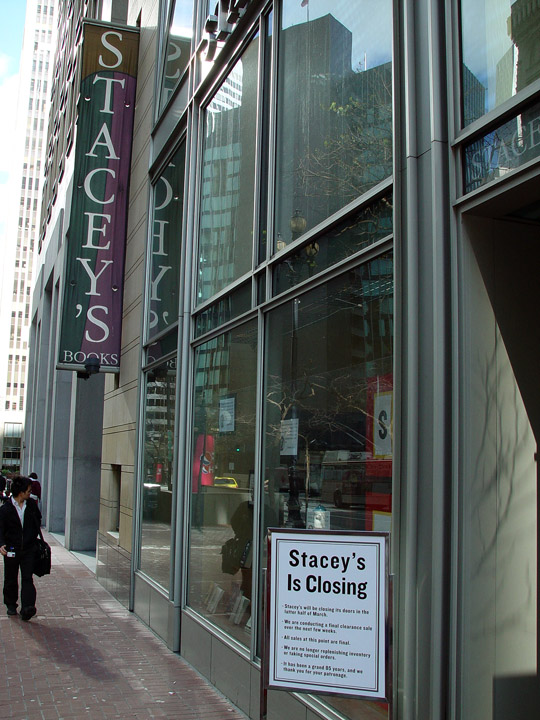 A community-funded report published with support from Spot.us
A community-funded report published with support from Spot.us
After 85 years in business – selling millions of books during that time – a San Francisco landmark soon will close its doors to the public.
Stacey’s Bookstore, located at 581 Market St., held its final lunchtime author event Wednesday as hundreds of faithful supporters, former employees, local authors and more walked the aisles of the shop for what may be their last time. The bookstore will close for good the week of March 16.
“I can remember coming here 20 years ago and my book would always make the best-seller list because of what Stacey’s would do in business bestseller lists,” local author Susan RoAne said. “When I read the news, I gulped … this is just heartbreaking for all of us. Stacey’s has been wonderful to me.”
As literary fans listened to noted mystery and detective novelist Cara Black read from her latest book, others took advantage of the 50 percent off all merchandise sale. Despite the empty shelves, customers continued to stroll in throughout the afternoon to experience a piece of history.
Assistant Manager Edward Gaulke – who said he hadn’t seen it this busy since November – reflected on why the closure finally took place.
“By the time people really start to take notice that independent bookstores are closing it will be too late,” Gaulke said, comparing the closure to an election where “the voters turned out (only) with their pocketbooks in mind.” He attributes the shift to the low prices of books found on Web sites like Amazon.com and at chains like Borders and Barnes and Noble. “We had some votes for independent bookstores, but it just wasn’t enough.”
In 2001, the American Booksellers Association filed an antitrust suit against Borders and Barnes and Noble in federal court in San Francisco, which was the culmination of two decades of legal challenges to the power of the chains as the independents tried to stem their decline. The share of the book market held by the independent stores has dwindled steadily over the last 30 years as consumers turned to shopping mall chains, superstores, discount warehouses and, finally, online stores. Over the last 10 years, the independents’ share of the consumer book market has fallen drastically.
Stacey’s reportedly generates more than $4 million in sales each year; however, increasing expenses and steadily decreasing sales prompted the owners to vacate before the current lease expires in 2011.
“Our customers started deserting us in 2001-2002 and it has been a steady decline ever since,” Gaulke said. “And our loyal customers would tell us, ‘we can get it cheaper on Amazon.com.’ We can’t compete with the low prices on the Internet.”
Stacey’s is just one of several Bay Area independent bookstores that has closed its doors in recent years, including Cody’s Books in Berkeley, which shut its doors last June after 52 years in business. For Stacey’s, it was a longer haul.

Stacey’s Bookstore grew out of a discussion in 1921 between botanist and bookseller John W. Stacey and a prominent San Francisco physician some 10,000 feet up in the Sierra Nevada Mountains. Realizing the need for medical books in the area was pressing, Stacey called on close to 50 doctor friends and was able to raise $20,000 to open the bookstore that carries his name.
By 1946, after 25 years of specializing in medical books, the bookstore began to carry a comprehensive line of professional and technical titles, including the first computer books ever published. In 1959, Stacey’s expanded to a second location and in the 1960s, it began to sell general trade books.
Ingrid Nystrom, Stacey’s marketing and events manager, said the loss of the store is the price people have to pay when they resort to online for all their literary needs.
“If the community is only going to shop virtually and live virtually, then they’re not going to have a store to walk into of any kind,” Nystrom said. “We still sold $4.5 million worth of books last year, which is a lot of books. But this is a very expensive space and our landlord would not negotiate.”
And so, with disappointment from employees and faithful customers, the doors must close.










